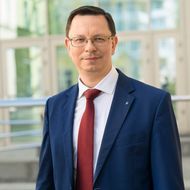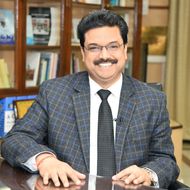HSE, University of Delhi, and Geoscan Launch Space Research Project
.jpg)
HSE University and the University of Delhi (India), in partnership with Geoscan (a portfolio company of the Innopraktika non-state development institute), have agreed to establish an international scientific mirror laboratory on data storage, processing, and transmission in space systems. The agreement was signed on January 15, 2025, during a visit to India by an HSE University delegation led by Rector Nikita Anisimov.
Since 2022, HSE University has been steadily building collaborations with leading Indian universities, with its campus in St Petersburg overseeing this initiative. ‘The launch of the mirror laboratory is not just a new stage in Russian-Indian scientific cooperation but a synergy of our joint efforts. This project combines the expertise of Russia and India in space technologies and strengthens global connections for advancing cutting-edge research,’ emphasised Anna Tyshetskaya, director of HSE University-St Petersburg and the project initiator.
HSE University-St Petersburg will coordinate the project, utilising the resources and expertise of all HSE campuses. The laboratory will focus on educational initiatives in space technologies, research in space communication, satellite development and monitoring training, and providing data for projects in astrophysics, meteorology, geography, and astrobiology.

The project partner, Geoscan (a portfolio company of the Innopraktika non-state development institute), specialises in developing unmanned aerial systems, small spacecraft, and software for data processing and 3D visualisation. In 2023, the company launched the Network of Open Ground Stations (SONICS). These stations allow students to interact with an open satellite network, collect data, and gain experience. Students have already acquired over 1,000 images and more than 15 million data packets using this network.
As part of the mirror laboratory’s work, Indian universities are expected to join the SONICS system. With Geoscan's support, the collaboration will expand in the areas of small spacecraft development and data sharing with the SONICS system. Plans also include creating a fully functional 3U CubeSat satellite model for educational purposes, complete with all the capabilities of a real satellite, and developing educational materials for students on small spacecraft design and operation.

Anna Tyshetskaya
‘This project is unique for us: we are launching it with the support of Russian technological leaders and in partnership with a leading Indian university. This is not just a joint laboratory but a ground-breaking project that opens a new direction in our international activities,’ said Anna Tyshetskaya.

Nikita Anisimov
HSE University Rector Nikita Anisimov emphasised the importance of the partnership with the University of Delhi. He recalled that in April 2024, an agreement on strategic cooperation and joint actions was signed, establishing an HSE research hub at the University of Delhi. ‘Today, this hub is gradually being filled with concrete projects, such as the mirror laboratory for space research,’ he said.
Nikita Anisimov also highlighted the significance of Russian-Indian cooperation in space research.
‘Cooperation in space is a priority area of Russian-Indian strategic interaction. I am confident that our mirror laboratory will contribute to this process. HSE University, particularly through Tikhonov Moscow Institute of Electronics and Mathematics (MIEM), has developed significant expertise in information technologies, including data storage and transmission, as well as in innovative technologies for space research, and we are ready to share this experience for our common cause. The involvement of industrial partners like Innopraktika and Geoscan is also crucial. Their competencies and experience provide the foundation needed to realise all our plans,’ he stated.

Yogesh Singh
‘I am very pleased to see familiar faces here at the University of Delhi. This is already the fifth visit by an HSE delegation to India, and with each visit, our collaboration becomes stronger. Last time, Rector Nikita Anisimov visited us, and our representatives also travelled to Russia. We truly have much in common and much to learn from each other,’ said Vice Chancellor of University of Delhi Yogesh Singh. ‘Strengthening our cooperation will benefit both sides. For instance, currently, there are only a few Russian students studying with us, but we would like to see this number grow in the near future.’ Yogesh Singh expressed hope that joint educational and research projects ‘will benefit the young and talented minds of Russia and India, helping us achieve numerous goals for the common good.’

Natalia Popova
Natalia Popova, First Deputy General Director of Innopraktika, noted that this was her first visit to the University of Delhi. ‘I am visiting the University of Delhi for the first time, and from my very first moments here, I felt how closely connected our cultures are. Together, we can implement numerous research and educational projects across various fields, conduct seminars, hackathons, and accelerators,’ commented Natalia Popova. Collaboration with leading Russian and Indian universities in the field of space research is a promising area and an important step ‘on our shared path to a high-tech future,’ she emphasised.
The University of Delhi, established in 1922, is a leading Indian university renowned for its high standards of teaching and research. It comprises 16 faculties and 86 departments across its campuses and is one of the largest university systems in the world, with over 400,000 students enrolled in its campuses and affiliated colleges.
See also:
HSE and UTM Present Results of Mirror Laboratory's Work at Russian–Malaysian Commission
HSE University–St Petersburg and the Universiti Teknologi Malaysia (UTM) presented the results of two years of work and a development roadmap for the mirror laboratory on social entrepreneurship. The document outlines the strategy for global transformation in the business and digital innovation sphere.
'We View Mathematics as a Universal Language for Natural Sciences, Economics, and Computer Science'
The Laboratory for Geometric Algebra and Applications at the HSE Faculty of Economic Sciences is developing a universal language for mathematics, physics, and other exact and natural sciences. It is creating computational methods that are applied in geometry, physics, machine learning, engineering, computer science, and other fields. The laboratory’s staff, including doctoral students, have published numerous articles in leading scientific journals and have taken part in major international conferences. Dmitry Shirokov, Head of the Laboratory, spoke with the HSE News Service about their work.
HSE Researchers Introduce Novel Symmetry-Aware Neural Network Architecture
Researchers at the HSE Laboratory for Geometric Algebra and Applications have developed a new neural network architecture that can accelerate and streamline data analysis in physics, biology, and engineering. The scientists presented their solution on July 16 in Vancouver at ICML 2025, one of the world's leading conferences on machine learning. Both the paper and the source code are publicly available.
'Biotech Is Booming Worldwide'
For more than five years, the International Laboratory of Bioinformatics at the HSE Faculty of Computer Science has been advancing cutting-edge research. During this time, its scientists have achieved major breakthroughs, including the development of CARDIOLIFE—a unique genetic test unmatched worldwide that predicts the likelihood of cardiovascular disease. With the active participation of HSE students, including doctoral students, the team is also working on a new generation of medicines. In this interview with the HSE News Service, Laboratory Head Maria Poptsova shares insights into their work.
'Samarkand—St Petersburg': HSE University–St Petersburg and Samarkand State University to Design Digital Future of Cultural Heritage
Samarkand State University named after Sharof Rashidov hosted the international research and educational seminar 'Branding Cultural Heritage: Digital Tools and Design Practices.' The event gathered researchers and students from Russia and Uzbekistan—participants of a large-scale project of the mirror laboratory 'Integrated Platform Solutions for the Preservation and Promotion of Cultural Heritage (Cases of Samarkand and St Petersburg)'.
'Our Goal Is Not to Determine Which Version Is Correct but to Explore the Variability'
The International Linguistic Convergence Laboratory at the HSE Faculty of Humanities studies the processes of convergence among languages spoken in regions with mixed, multiethnic populations. Research conducted by linguists at HSE University contributes to understanding the history of language development and explores how languages are perceived and used in multilingual environments. George Moroz, head of the laboratory, shares more details in an interview with the HSE News Service.
AI to Enable Accurate Modelling of Data Storage System Performance
Researchers at the HSE Faculty of Computer Science have developed a new approach to modelling data storage systems based on generative machine learning models. This approach makes it possible to accurately predict the key performance characteristics of such systems under various conditions. Results have been published in the IEEE Access journal.
HSE University–St Petersburg Presents Project on Social Entrepreneurship at Session of Russian–Malaysian Working Group
Alexander Sorokin, Dean of the St Petersburg School of Social Sciences, presented the results of a joint Russian–Malaysian mirror laboratory project in social entrepreneurship at the second meeting of the Russian–Malaysian Working Group on Education, Science, and Technology at the Universiti Teknologi Malaysia (UTM).
'The Branch of Medicine That Our Developments Primarily Target Is Cardiology'
The application of mathematical models to the diagnosis and treatment of cardiovascular diseases contributes to the effective detection of patient predispositions and supports the selection of best treatment strategies. The use of mathematical models helps create new diagnostic tools and train neural networks to assist clinicians. Researchers from HSE University and colleagues from Saratov State Medical University are engaged in this work as part of the Mirror Laboratories project. In this interview, Natalya Stankevich, Senior Research Fellow at the International Laboratory of Dynamical Systems and Applications of the HSE Campus in Nizhny Novgorod, talks about what the collaboration has achieved so far.
Mirror Laboratory of HSE and UTM Shares Its First Achievements
In autumn of 2024, a delegation from Malaysia, led by Minister of Higher Education Zambry bin Abdul Kadir, visited the HSE campus in St Petersburg. One of the key topics of discussion was the initial results of the mirror laboratory, a joint initiative between HSE University-St Petersburg and the University of Technology Malaysia (UTM).


